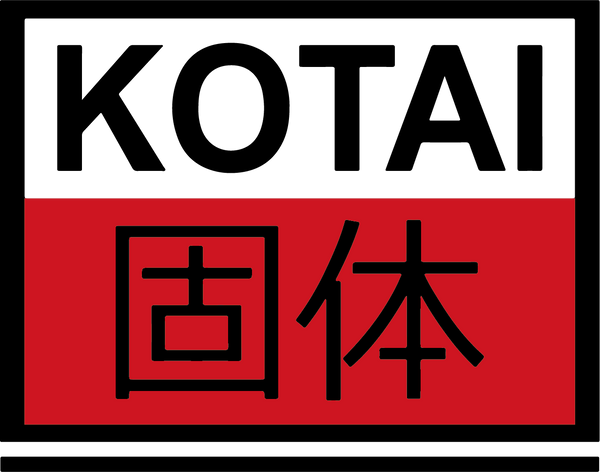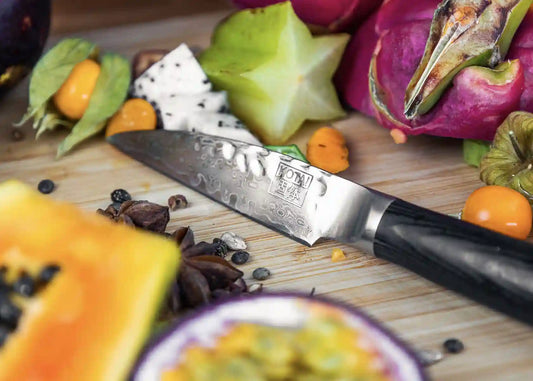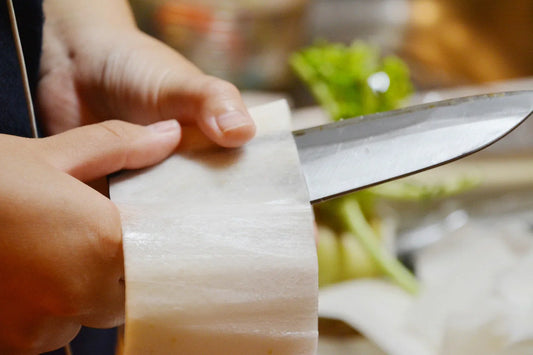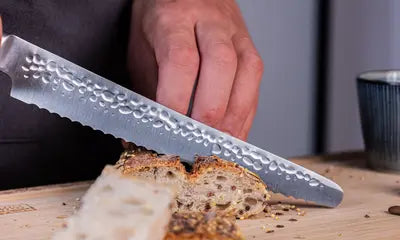Which knife(s) should I choose as a beginner in cooking?
Choosing your first kitchen knife is important, because it is the one that will stay in your mind! The most popular kitchen knives are chef's knives, paring knives and serrated knives. However, each knife has its own characteristics, such as blade length, weight and handle design, making it suitable for specific tasks.
Today, we will guide you through the best way to choose your first knife...
How to choose my first kitchen knife?

I - Think carefully before deciding...
Researching about the knife you wish to buy is essential, as it will reduce the uncertainty linked with your online purchase.
Plan your budget accordingly based on your expectations of the knife and its use. Be careful, however, if you find a cheap chef's knife, it will probably not meet your expectations in terms of quality - durability and performance.
TIP: It's better to buy a premium knife that will last a lifetime thanks to good maintenance, rather than a set of cheap knives that will quickly disappoint you.

II - Function over aesthetics!
When buying your first kitchen knife, you should prioritize function over aesthetics, as it must help you prepare food efficiently. A good kitchen knife should therefore feature...
- A comfortable handle and a well-balanced blade for ease of use,
- A cutting edge able to perform various cutting tasks with ease - to be maintained, obviously!

III - Consider it a lifetime partner!
This is not just a knife you are about to buy, it is a partner for life! Regular maintenance by sharpening and/or honing is therefore essential; if you have doubts, check our simple guide.
As part of your knife maintenance ritual, you'll need a honing steel and/or a sharpening stone (or whetstone). A honing steel is regularly used to maintain the edge of your knife, while a whetstone (180/800 or 2000/6000) is less frequently used with the aim of restoring the edge of a dull blade.
KOTAI's Recommendations
The Gyuto; or the chef's knife
By definition, "GYUTO" is a knife originally designed for cutting meat. Today, however, its use has evolved into a versatile and essential knife in your kitchen! With an average blade size of between 18 and 21 centimeters, it's an easy-to-handle knife that brings precision to cutting vegetables and meat.

The Gyuto Chef's Knife PAKKA Collection - KOTAI
Our Gyuto PAKKA Collection in Japanese 440C stainless steel has a 20-centimeter blade, the ideal size for a good balance between handle and blade. The Gyuto has the best of two distinct worlds: Japanese sharpness combined with German robustness. Finally, the hammering (present on all our knives) on the blade prevents food from sticking to the knife when cutting.
+ Want to see our Gyuto in Damascus steel?
The Santoku; or the versatile knife.
"SANTOKU", or "three virtues", is the perfect definition of this knife's versatility. Able to chop vegetables, slice meat and even prepare fish, it'll be your best ally if you're starting out! The blade can measure between 10 and 20 centimeters, making the Santoku light and easy to handle.

The Santoku PAKKA Collection - KOTAI
Our Santoku PAKKA Collection, in Japanese 440C stainless steel, features an 18-centimeter blade. Lightweight and robust, it will enable you to perform all kinds of kitchen tasks. As its blade is shorter and flatter than a traditional chef's knife (like the Gyuto), it is easier to handle and manipulate for tasks such as mincing herbs, slicing vegetables, etc.
+ Want to see our Santoku PAKKA in Damascus steel?

The Santoku BUNKA Collection - KOTAI
Our Santoku BUNKA Collection is a slightly smaller version of the classic Santoku, with a 17-centimeter blade. Easily recognizable thanks to its "Inverted Tanto" - or "K-tip" - blade profile, which is shaped differently from the common Santoku, it offers greater precision when cutting.
+ Want to see our Santoku BUNKA in Damascus steel?
The Petty; or the universal knife.
The "PETTY" is an all-purpose knife that falls perfectly between a paring knife and a chef's knife, representing a good alternative if you are struggling to choose! Thanks to its small and compact size, you will be able to make precise and complex cuts, as well as peel fruits and vegetables.

The Petty Knife BUNKA Collection - KOTAI
Our Petty Knife BUNKA Collection, forged from Japanese 440C stainless steel, features a 13.5-centimeter blade. It represents the Japanese equivalent of a small utility knife, and excels in detailed cutting tasks where a chef's knife would be too cumbersome. Finally, its hidden full tang blade offers optimal balance and durability to the knife.
+ Want to see our Petty BUNKA in Damascus steel?
Let's recap?
When choosing your first kitchen knife, you should consider its utility in your daily life, your comfort as well as your personal preferences.
- The Gyuto Chef's Knife PAKKA Collection is a good versatile option if you are more comfortable with a long knife,
- Smaller, the Santoku Knife PAKKA Collection (or BUNKA Collection) is the multi-tasker to have in your kitchen for a smooth but steady start,
- Finally, the Petty Knife BUNKA Collection is the perfect combo if you want to start with a small blade; it will enable you to peel, to slice and mince aliments like a Gyuto.
TIPS: Consider the blade material. Look for a comfortable handle with good balance. Test the grip by yourself before deciding to buy a knife!




